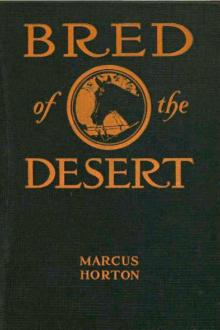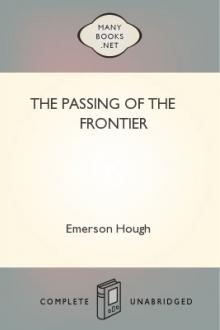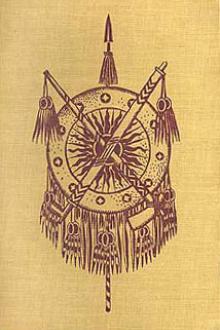A Deal in Wheat and Other Stories of the New and Old West, Frank Norris [best interesting books to read TXT] 📗

- Author: Frank Norris
Book online «A Deal in Wheat and Other Stories of the New and Old West, Frank Norris [best interesting books to read TXT] 📗». Author Frank Norris
So the fortnightly trips to town in company with Lockwood were explained in various fashions to Felice. She never knew that the mail-bag strapped to her husband's shoulders on those occasions carried some five thousand dollars' worth of bullion.
On a certain Friday in early June Lockwood had amalgamated, and the brick, duly stamped, lay in the safe in the office. The following night he and Chino, who was relieved from mine duty on these occasions, were to take it in to Iowa Hill.
Late Saturday afternoon, however, the engineer's boy brought word to Chino that the superintendent wanted him at once. Chino found Lockwood lying upon the old lounge in the middle room of the office, his foot in bandages.
"Here's luck, Chino," he exclaimed, as the Mexican paused on the threshold. "Come in and—shut the door," he added in a lower voice.
"Dios!" murmured Chino. "An accident?"
"Rather," growled Lockwood. "That fool boy, Davis's kid—the car-boy, you know—ran me down in the mine. I yelled at him. Somehow he couldn't stop. Two wheels went over my foot—and the car loaded, too."
Chino shuddered politely.
"Now here's the point," continued Lockwood. "Um—there's nobody round outside there? Take a look, Chino, by the window there. All clear, eh? Well, here's the point. That brick ought to go in to-night just the same, hey?"
"Oh—of a surety, of a surety." Chino spoke in Spanish.
"Now I don't want to let any one else take my place—you never can tell—the beggars will talk. Not all like you, Chino."
"Gracias, sigñor. It is an honour."
"Do you think you can manage alone? I guess you can, hey? No reason why you couldn't."
Chino shut his eyes tight and put up a palm. "Rest assured of that,
Sigñor Lockwude. Rest assured of that."
"Well, get around here about nine."
"It is understood, sigñor."
Lockwood, who had a passable knowledge of telegraphy, had wired to the Hill for the doctor. About suppertime one appeared, and Lockwood bore the pain of the setting with such fortitude as he could command. He had his supper served in the office. The doctor shared it with him and kept him company.
During the early hours of the evening Lockwood lay on the sofa trying to forget the pain. There was no easier way of doing this than by thinking of Felice. Inevitably his thoughts reverted to her. Now that he was helpless, he could secure no diversion by plunging into the tunnel, giving up his mind to his work. He could not now take down his gun and tramp the ditch. Now he was supine, and the longing to break through the mesh, wrestle free from the complication, gripped him and racked him with all its old-time force.
Promptly at nine o'clock the faithful Chino presented himself at the office. He had one of the two horses that were used by Lockwood as saddle animals, and as he entered he opened his coat and tapped the hilt of a pistol showing from his trousers pocket, with a wink and a grin. Lockwood took the brick from the safe, strapped it into the mail-bag, and Chino, swinging it across his shoulders, was gone, leaving Lockwood to hop back to the sofa, there to throw himself down and face once more his trouble.
IV. A DESPATCH FROM THE EXPRESS MESSENGERWhat made it harder for Lockwood just now was that even on that very day, in spite of all precaution, in spite of all good resolutions, he had at last seen Felice. Doubtless the young woman herself had contrived it; but, be that as it may, Lockwood, returning from a tour of inspection along the ditch, came upon her not far from camp, but in a remote corner, and she had of course demanded why he kept away from her. What Lockwood said in response he could not now remember; nor, for that matter, was any part of the conversation very clear to his memory. The reason for this was that, just as he was leaving her, something of more importance than conversation had happened. Felice had looked at him.
And she had so timed her look, had so insinuated it into the little, brief, significant silences between their words, that its meaning had been very clear. Lockwood had left her with his brain dizzy, his teeth set, his feet stumbling and fumbling down the trail, for now he knew that Felice wanted him to know that she regretted the circumstance of her marriage to Chino Zavalla; he knew that she wanted him to know that the situation was as intolerable for her as for him.
All the rest of the day, even at this moment, in fact, this new phase of the affair intruded its pregnant suggestions upon his mind, to the exclusion of everything else. He felt the drift strong around him; he knew that in the end he would resign himself to it. At the same time he sensed the abyss, felt the nearness of some dreadful, nameless cataclysm, a thing of black shadow, bottomless, terrifying.
"Lord!" he murmured, as he drew his hand across his forehead, "Lord! I wonder where this thing is going to fetch up."
As he spoke, the telegraph key on his desk, near at hand, began all at once to click off his call. Groaning and grumbling, Lockwood heaved himself up, and, with his right leg bent, hobbled from chair-back to chair-back over to the desk. He rested his right knee on his desk chair, reached for his key, opened the circuit, and answered. There was an instant's pause, then the instrument began to click again. The message was from the express messenger at Iowa Hill.
Word by word Lockwood took it off as follows:
"Reno—Kid—will—attempt—hold-up—of— brick—on—trail-to-night—do—not—send— till—advised—at—this—end."_
Lockwood let go the key and jumped back from the desk, lips compressed, eyes alight, his fists clenched till the knuckles grew white. The whole figure of him stiffened as tense as drawn wire, braced rigid like a finely bred hound "making game."
Chino was already half an hour gone by the trail, and the Reno Kid was a desperado of the deadliest breed known to the West. How he came to turn up here there was no time to inquire. He was on hand, that was the point; and Reno Kid always "shot to kill." This would be no mere hold-up; it would be murder.
Just then, as Lockwood snatched open a certain drawer of his desk where he kept his revolver, he heard from down the road, in the direction of Chino's cabin, Felice's voice singing:
"To the war I must go,
To fight for my country and you, dear."
Lockwood stopped short, his arm at full stretch, still gripping tight the revolver that he had half pulled from the drawer—stopped short and listened.
The solution of everything had come.
He saw it in a flash. The knife hung poised over the knot—even at that moment was falling. Nothing was asked of him—nothing but inertia.
For an instant, alone there in that isolated mining-camp, high above the world, lost and forgotten in the gloom of the cañons and redwoods, Lockwood heard the crisis of his life come crashing through the air upon him like the onslaught of a whirlwind. For an instant, and no more, he considered. Then he cried aloud:
"No, no; I can't, I can't—not this way!" And with the words he threw the belt of the revolver about his hips and limped and scampered from the room, drawing the buckle close.
How he gained the stable he never knew, nor how he backed the horse from the building, nor how, hopping on one leg, he got the headstall on and drew the cinches tight.
But the wrench of pain in his foot as, swinging up at last, he tried to catch his off stirrup was reality enough to clear any confusion of spirit. Hanging on as best he might with his knees and one foot, Lockwood, threshing the horse's flanks with the stinging quirt that tapered from the reins of the bridle, shot from the camp in a swirl of clattering hoofs, flying pebbles and blinding clouds of dust.
V. THE TRAILThe night was black dark under the redwoods, so impenetrable that he could not see his horse's head, and braced even as he was for greater perils it required all his courage to ride top-speed at this vast slab of black that like a wall he seemed to charge head down with every leap of his bronco's hoofs.
For the first half-hour the trail mounted steadily, then, by the old gravel-pits, it topped the divide and swung down over more open slopes, covered only with chaparral and second growths. Here it was lighter, and Lockwood uttered a fervent "Thank God!" when, a few moments later, the moon shouldered over the mountain crests ahead of him and melted the black shadows to silver-gray. Beyond the gravel-pits the trail turned and followed the flank of the slope, level here for nearly a mile. Lockwood set his teeth against the agony of his foot and gave the bronco the quirt with all his strength.
In another half-hour he had passed Cold Cañon, and twenty minutes after that had begun the descent into Indian River. He forded the river at a gallop, and, with the water dripping from his very hat-brim, drove labouring under the farther slope.
Then he drew rein with a cry of bewilderment and apprehension. The lights of Iowa Hill were not two hundred yards distant. He had covered the whole distance from the mine, and where was Chino?
There was but one answer: back there along the trail somewhere, at some point by which Lockwood had galloped headlong and unheeding, lying up there in the chaparral with Reno's bullets in his body.
There was no time now to go on to the Hill. Chino, if he was not past help, needed it without an instant's loss of time. Lockwood spun the horse about. Once more the ford, once more the cañon slopes, once more the sharp turn by Cold Cañon, once more the thick darkness under the redwoods. Steadily he galloped on, searching the roadside.
Then all at once he reined in sharply, bringing the horse to a standstill, one ear turned down the wind. The night's silence was broken by a multitude of sounds—the laboured breathing of the spent bronco, the saddle creaking as the dripping flanks rose and fell, the touch of wind in the tree-tops and the chorusing of the myriad tree-toads. But through all these, distinct, as precise as a clock-tick, Lockwood had heard, and yet distinguished, the click of a horse's hoof drawing near, and the horse was at a gallop: Reno at last.
Lockwood drew his pistol. He stood in thick shadow. Only some twenty yards in front of him was there any faintest break in the darkness; but at that point the blurred moonlight made a grayness across the trail, just a tone less deep than the redwoods' shadows.
With his revolver cocked and trained upon this patch of grayness,
Lockwood waited, holding his breath.
The gallop came blundering on, sounding in the night's silence as loud as the passage of an express train; and the echo of it, flung back from the cañon side, confused it and distorted it till, to Lockwood's morbid alertness, it seemed fraught with all the madness of flight, all the hurry of desperation.
Then the hoof-beats rose to a roar, and a shadow just darker than the darkness heaved against the grayness that Lockwood held covered with his pistol. Instantly he shouted aloud:
"Halt! Throw up your hands!"
His answer was a pistol shot.
He dug his heels to his horse, firing as the animal leaped forward. The horses crashed together, rearing, plunging, and Lockwood, as he felt the body of a man crush by him on the trail, clutched into the clothes of him, and, with the pistol pressed against the very flesh, fired again, crying out as he did so:
"Drop your gun, Reno! I know you. I'll kill you if you move again!"
And then it was that a wail rose into the night, a wail of agony and mortal apprehension:
"Sigñor Lockwude, Sigñor Lockwude, for the love of God, don't shoot!
'Tis I—Chino Zavalla."
An hour later, Felice, roused from her sleep by loud knocking upon





Comments (0)